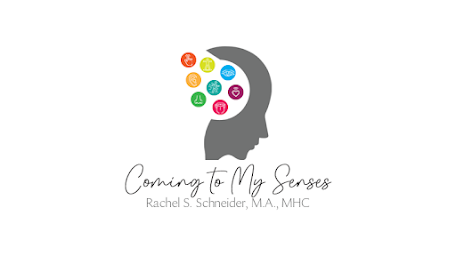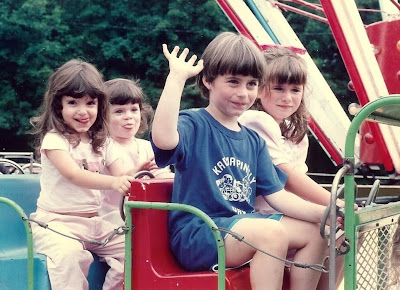Photographic Evidence
Take a look at this photo of me, my sister, and my cousins from 1989. I'm the bangs and bow in the front row, in case you weren't sure. How could you know? Well, for one, I'm the only one making that face on what other (read: neurotypical) kiddos would call a fun ride. My cousin, waving carelessly into the summer air, is holding the wheel, as am I, but where his arm is slack, my arm is taught. I am clearly hanging on tightly while the car spins round and round, my smile stretched thin. It's a strange feeling seeing this photo 24 years after it was taken. I have always been a camera hog, seizing any moment to purposefully pose in full, gleaming grin. But here, this little girl, she's unaware of the camera and the photographer. She's so clearly scared and uncertain.
Where am I looking? Out somewhere, into the distance - maybe even lost inside, reeling from the input. I've made this face before. My husband points it out to me when I've hit my sensory limit. "That's your sensory face," he emails me matter-of-factly from work, after seeing the photo, "it's how I can tell you're having sensory issues when I'm not near you."
Sometimes I forget that I'm not just an adult with SPD. I was a kid with SPD too . . . just no one had heard of it back in the 80s.
I find myself whispering at the photo, comforting her - me - as she - we - prepares for another pass around the circumference of the ride. "It's going to be okay," I plead softly with the face of my past, "this will ultimately make you stronger. This will be given a name. This will make you an advocate, compassionate, a cheerleader and champion of those in need of support."
"It's going to be okay. This will make you - us - me."




Wow Rach, I never realized this before. All I saw in that photo was my beautiful big girl. Amazing!
ReplyDeleteI have a picture like this of my 9 year at the fair a few years ago. I actually have several pics like this. Him at a Halloween party in his costume in the corner. One where he is at a park sitting on a bench trying not to touch anything with his look on his face. Really wish I knew then what I do now. Thank you. At least we finally found out what was going on. I will remember that everything he deals with is making him stronger.
ReplyDeleteIt's amazing when the camera captures a true sensory face. This pic is only the second one I've found - when I knew the camera was around, I was a photohog. When it caught me by surprise, however, apparently I looked like this. I appreciate knowing you captured your son with a similar face. Reminds me that SPD does not discriminate, and somehow validates that little girl in the photo (and inside).
DeleteThis is a great article about your personal experience! I have a professor at Remington College who would love to guest post on your blog about Occupational Therapy. Would this be possible?
ReplyDeleteAndrew Morris
andrew.morris@plattform.com
Hi Andrew,
ReplyDeleteI sent you an email to discuss further.
Thanks!
I'm the one in the back seat, licking my lips with anticipation of the fun ride (sensory seeking)...
ReplyDeleteI was just diagnosed with SPD (I'm 27). People always thought I was just shy, but now I know why I was so frozen and uncomfortable in public. I have many pictures like this growing up. Somehow, I've managed to get a bachelors degree and do well in academics and sports in general. One big tip off (besides covering my ears as a child in noisy environments) was the fact I repeatedly rocked back and forth when I was overloaded. The rocking helps me get focused and re-oriented. Question: Would you suggest occupational therapy? All I can find are programs for children. I would love to know any life changes/adjustments you've made that help you function day to day. I've always struggled with not being able to see things (if I can't see it, it doesn't exist). For instance, I've had to take the doors off my closet so that I can dress in the morning without having a meltdown. Are adaptations like this healthy or is there a way to help me function in a better way?
ReplyDeleteThanks!
hctwins@netzero.net
I was diagnosed at 27 too! Would absolutely suggest OT and psychotherapy to discuss a late diagnosis and deal with any secondary issues (anxiety, depression). You can email me at coming2mysenses@gmail.com - happy to discuss further!
DeleteRachel :)
I was diagnosed with SPD when I was 26 and in college. I haven't had any treatment and think my anxiety problems developed out of my SPD. Just recently I found a picture of me as a child plugging my ears as my friends sang "Happy Birthday" to me. I was really struck by it, my SPD was even seen then though nobody knew what was wrong with me.
ReplyDeleteRachel, there's an NLP technique called Change History and that's essentially what you are doing when you reassure that little girl that she is OK and will survive this experience and the others like it and that she'll grow up to have a trusted and fully understanding adult self who will always take care of her (giving her the resources she did not have at the time to grow up knowing she's all right). Like all of NLP, it's what intuitively healthy and successful people have always done (without it being codified until it was modeled by NLP). Finding a good NLP trained psychotherapist to do this revision work with the misunderstood (or worse) child inside an SPD adult might be a good thing in addition to OT. Clears up those childhood memories directly and quickly, building a foundation of self-acceptance and even self-love for the ongoing work of living.
ReplyDeleteThis is great information, thanks Karen!
Delete